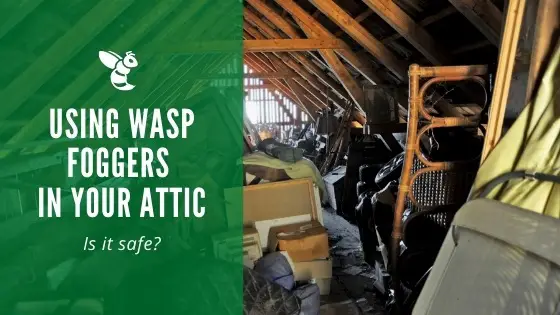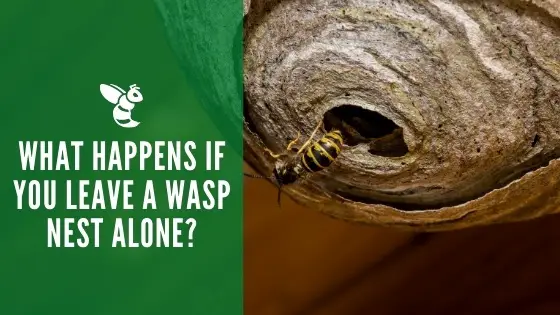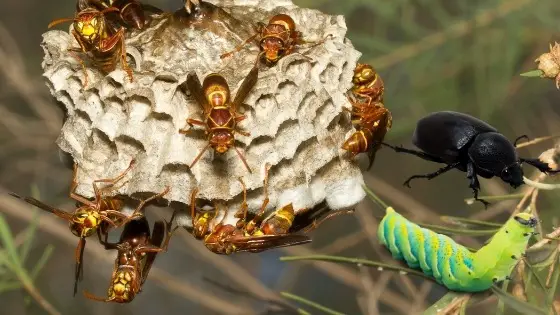Using Wasp Foggers in Your Attic

Foggers have been a staple of pest control for years. They are a simple way to treat a large area, and foggers will kill many insects that can irritate homeowners. While foggers can be effective, it is important that you learn how to use them properly, especially in an attic.
What are wasp foggers (bug bombs)?
Wasp foggers (bombs) are devices designed for pest control. They billow out an insecticidal gas that kills insects on contact, clearing out a room easily. Consumer foggers are usually cans containing a pressurized gas released by a timed mechanism on the top.
To use a fogger, you activate the release mechanism, place it in the area you would like to clear of insects, and wait for the 3 or 4 second countdown.
Foggers should never be used in small areas. They will have an informative label that describes the proper amount of space for the fogger. If a fogger is used in a space that is too small, it can explode the area. These devices are meant for very specific conditions, so if you are unsure if you should be using a fogger, it is a good idea to hire a professional.
Foggers do not have a way to stop or pause their gas. Once they are activated, they will spill out insecticide until the canister is empty. If you use them in a space that is not sealed off or in a space that is too small, the gas will be pushed out through any crack, crevice, or hole that is available.
How do wasps get into your attic?
The dark haven that your attic offers is very appealing to many animals, and wasps are no exception. The attic provides shelter from predators, gentle airflow, and a quiet space to establish a nest. The extra protection that an attic gives to a wasp nest means that it can exponentially grow, creating a mess of problems for the homeowner.
Wasps are always looking for good nest locations. Their requirements are the same as humans: food, water, and shelter. An attic provides shelter, and food may not be hard to find, especially if you have the kind of wasp that eats wood. Other wasp prey may already have taken up residence in your attic, creating a feast for the wasps. This means that water is the only requirement that your attic may not supply.
If you have a pool or other standing water near your home, the third requirement will be filled, and wasps will be looking to move in (and don’t expect any rent payments). If possible, drain any standing water around your home or cover it. This may not always be feasible, but it is a good start to taking care of the wasp issue.
Social wasps like the paper wasp or yellow jacket will look for any crevice or hole that will support a nest structure. Vents in your attic, windows, or other openings are all they need to enter your home and set up their new apartment. You can try covering these kinds of openings with bug screens to keep them out, but this may not work.
Try sealing any openings you find that lead into your attic. However, never seal vents. These provide necessary airflow to your home, and closing them off can cause serious problems with mold or other issues.
How to use foggers in your attic
Using an insect fogger (bug bomb) in your attic may seem like an easy way to get rid of household pests at first, but you need to keep their limitations in mind. Always carefully read the label of any pest control product BEFORE use to ensure that you will not create a safety hazard. In general, bug foggers are safe for public use, but each product and home is different. It is usually best to leave attic treatment to the pros.
Insect foggers are probably not the best way for you to clear your attic of wasps or other insects if you are not a pest control professional. The insulation in your attic gives insects all the shelter they need to stay away from the toxic gas, unless you use specialized equipment, such as a directional fogger machine that can penetrate the thick insulation.
Before attempting to use a wasp fogger in your attic, consider the following. If your attic is too small, you run the risk of gas pouring out into areas that you do not want it to reach. On the other hand, large attics will need multiple fogger devices to cover the entire space.
Setting off multiple foggers at once is a difficult task, especially in spaces like the attic. You will need to race the bug fogger to reach your next fogging can, and then race the gas from each device to exit the attic before being surrounded by insecticide. While this is hard under normal circumstances, attics often have roofing trusses and insulation, so one wrong step can cause injury to you or your home or even trap you in the attic with the gas.
Other safety concerns increase with the use of foggers in the attic. Foggers emit pressurized gas, which is explosive if exposed to an ignition source. Any fine particles in the air can explosively combust if exposed to flame, and foggers are no different. Any exposed wiring or other potential ignition sources in your attic can turn a pest control treatment into some very unexpected remodeling.
For all of these reasons, it is not recommended to use foggers in the attic unless you are a trained professional. Suppose you insist on attempting to get rid of attic wasps yourself. In that case, we recommend trying either a traditional wasp trap, wasp killer powder, or wasp spray before even thinking about foggers. If attempting to get rid of the wasps yourself, be sure to take all of the correct safety measures and wear protective clothing to avoid any potential angry wasp stings.
Wasp and other flying insect infestations can be extremely frustrating, and you may be looking for the easiest solution, but it is always a better idea to hire someone with specialized equipment and training to take care of your pest problem for you.



